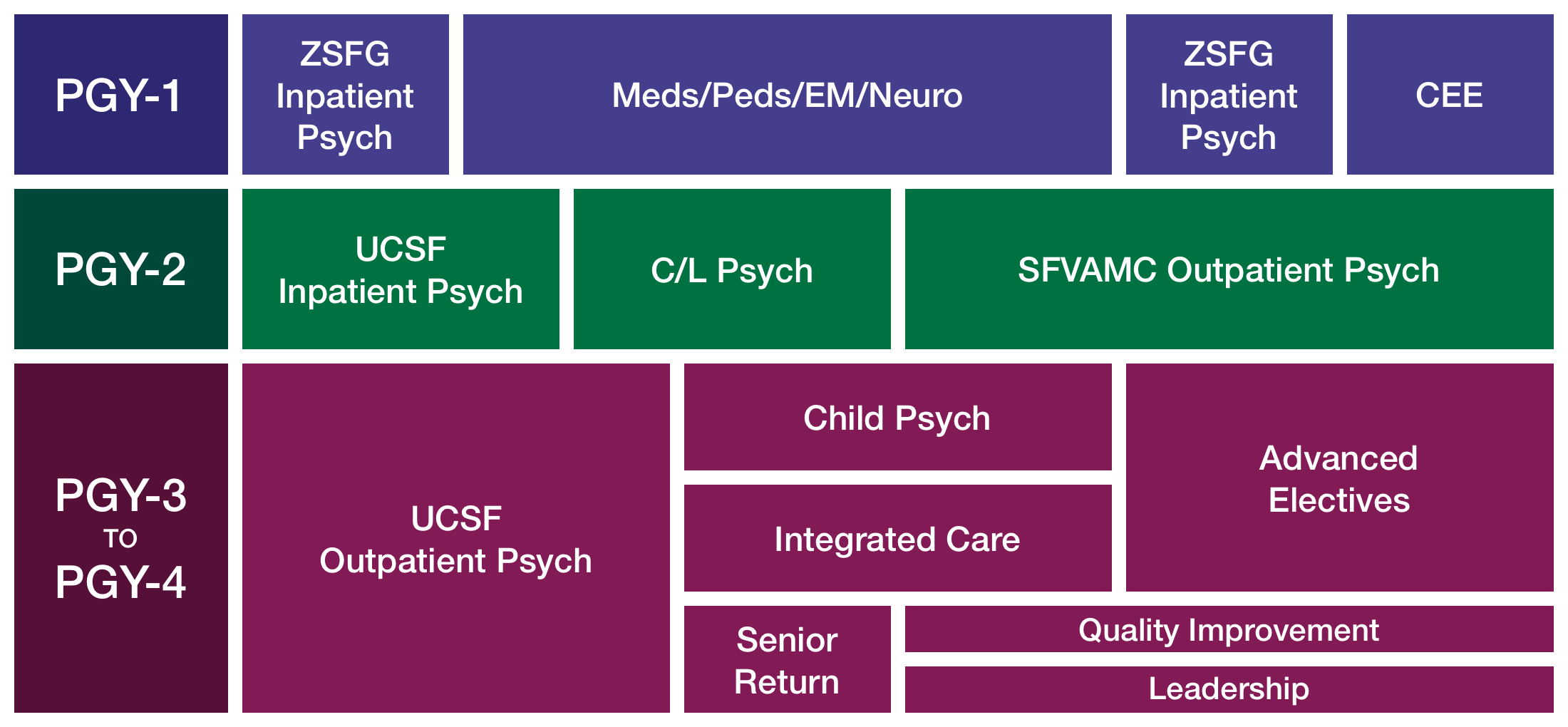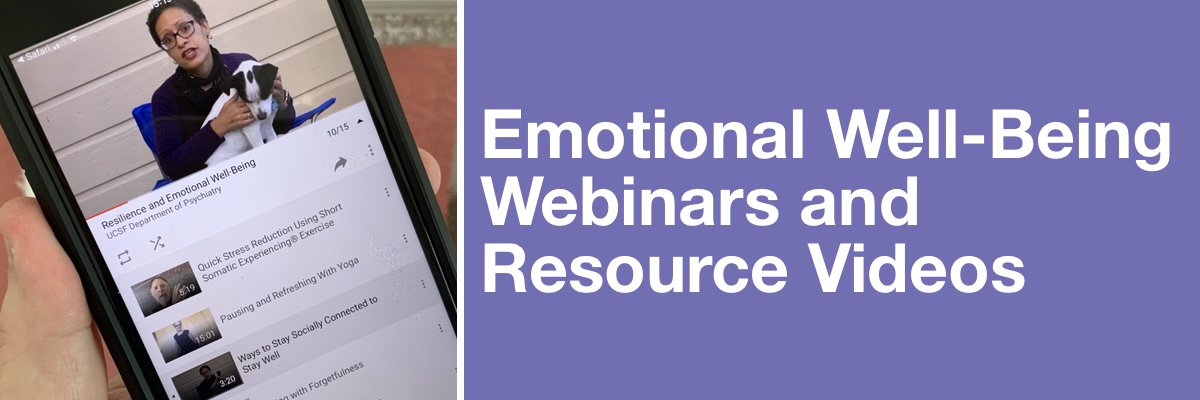UCSF emphasizes innovation and creativity, and the Adult Psychiatry Residency Training Program offers a clinical curriculum in which residents become expert clinicians and leaders in the field. The program provides broad exposure to a diversity of patients, modalities, therapies, and environments, while also highlighting longitudinal relationships with patients, faculty, and clinical systems.
The Longitudinal Clinical Experience (see Program Highlights for more detail) begins in the first year. Residents are assigned to a half-day clinic where they work in teams with faculty and resident peers (PGY-1 to PGY-4), providing assessment, pharmacotherapy, psychotherapy, and/or management to a cohort of patients in a specific population (e.g.: Women, Geriatric, LGBTQ+, etc.) that they will follow throughout their four years of residency.
Med/neuro
Six months of the PGY-1 year is spent completing rotations in medicine and neurology, including:
- Inpatient Medicine (2 months)
- Outpatient Medicine (1 month)
- Inpatient Neurology (1 month)
- Outpatient Neurology (1 month)
- Emergency Medicine (1 month)
These rotations occur at the UCSF Medical Center, Zuckerberg San Francisco General Hospital and Trauma Center (ZSFG), and the San Francisco VA Medical Center (SFVAMC). For those residents interested in a child psychiatry career, one of the months of inpatient medicine and inpatient neurology can be substituted with pediatrics and child neurology, respectively. Outpatient neurology is spent at the renowned UCSF Memory and Aging Center, where the experience will emphasize the behavioral and neuropsychiatric aspects of neurology.
Inpatient psychiatry
Four months of the PGY-1 year are spent learning the principles of inpatient psychiatric assessment and treatment at ZSFG, providing services to San Francisco’s underserved and chronically mental ill population. Here residents will gain experience working with a diverse population of patients (e.g., Black, Asian, Latinx, LGBTQ+, etc.). Residents also spend time in the San Francisco County Jail’s inpatient psychiatry unit located at ZSFG, learning forensic psychiatry.
Skills gained during intern year are further developed during a three-month rotation on the adult psychiatry inpatient unit at UCSF Langley Porter Psychiatric Hospital at Mount Zion during the PGY-2 year. This acute locked inpatient unit serves an extremely broad patient population, with ages ranging from late teens to 90+, from all socio-economic classes, and with a wide range of clinical presentations. There is also an active electroconvulsive therapy (ECT) service and residents gain direct experience working with patients receiving this treatment.
Finally, residents have the opportunity to return for one month as PGY-4s to the ZSFG or UCSF inpatient psychiatry services to solidify clinical knowledge, develop team management skills, and provide near-peer teaching to junior residents.
Clinical and Emergency Experience (CEE)
The Clinical and Emergency Experience (CEE) rotation takes place during the PGY-1 year. It is composed of four weeks of emergency psychiatry at ZSFG, providing emergent psychiatric services to San Francisco's underserved and chronically mentally ill population, and three weeks of exposure to outpatient psychiatric clinics and services across the health system. Clinics and services include specialty clinics at UCSF, transcranial magnetic stimulation at a private community organization, child psychiatry clinics at UCSF, ECT at UCSF, a community buprenorphine induction clinic, and a psychiatric urgent care service at the SFVAMC.
Consultation/liaison psychiatry
During the PGY-2 year, residents spend three months performing inpatient consultation/liaison psychiatry at ZSFG and the UCSF Parnassus campus, working closely with faculty to learn how to evaluate psychiatric manifestations of medical disorders and develop techniques to manage primary psychiatric disorders for patients who are medically hospitalized, in collaboration with other disciplines.
Residents may choose to return as PGY-4s for one month to the UCSF or ZSFG consultation/liaison services to solidify their clinical knowledge, develop team management skills, and provide near-peer teaching to junior residents.
San Francisco VA Medical Center (SFVAMC)
Six months of PGY-2 year is spent in a full-time rotation at SFVAMC, designed to give residents exposure to the principles of outpatient psychiatry evaluation and treatment at an early point in their training. With close supervision in several settings, residents learn a variety of treatment modalities including comprehensive diagnostic evaluations, pharmacotherapy, and psychotherapy. All residents participate in clinics devoted to rapid evaluation, substance use disorders, psychopharmacology and specialized PTSD treatment. Psychotherapy training includes individual therapy (interpersonal therapy and cognitive behavioral therapy), group therapy (substance use disorders and long-term process group), and couples/family therapy.
Adult outpatient psychiatry
The PGY-3 year is a largely outpatient experience located primarily at the UCSF Nancy Friend Pritzker Psychiatry Building near the UCSF Mission Bay campus. Residents provide a variety of psychiatric clinical services in this ambulatory care setting, including intake and assessment in specialty clinics and longitudinal psychotherapy and psychopharmacology. Specialty clinics are half-day clinics organized by diagnostic category or patient population and are designed to provide comprehensive teaching and “real-time” supervision. Clinics include Depressive Disorders, Bipolar Spectrum Disorders, Anxiety Disorders, Women’s Mental Health, Early Psychosis, Geriatrics, and LGBTQ+ Mental Health. Special attention is given to the educational experience of residents in the outpatient clinics to provide expert training, supervision and support in the application of diverse treatment models, including pharmacotherapy, neuromodulation, and psychotherapy (e.g., supportive psychotherapy, cognitive behavioral therapy (CBT), interpersonal psychotherapy (IPT), psychodynamic psychotherapy, dialectic behavioral therapy (DBT), problem solving therapy (PST), and acceptance and commitment therapy (ACT)). Emphasis on longitudinal care continues into the PGY-4 year, where residents carry cases over from the PGY-3 year.
Child and adolescent psychiatry
PGY-3 residents also spend one half-day per week throughout the year in child and adolescent psychiatry, which consists of didactics and clinical experience observing and conducting supervised comprehensive psychiatric evaluations of children, adolescents, and families. In addition, residents do weekly outpatient therapy with a child or adolescent and participate in weekly individual supervision about their case. Seminars teach residents about normal child development, therapy, and childhood psychopathology. Electives in the Tourette’s and Pervasive Development Disorders (Autism) Clinic are also available. Training sites include the UCSF Nancy Friend Pritzker Psychiatry Building, San Francisco Department of Public Health Community Behavioral Health Clinics (e.g., Chinatown Development Center), and UCSF Benioff Children's Hospital Oakland.
Integrated care experience (ICE)
During the PGY-3 or PGY-4 year, residents serve as clinicians and/or consultants in an integrated care model, in settings such as primary care, obstetrics, pediatrics, oncology, or neurology. The experience is highly interdisciplinary and residents have the opportunity to participate in team meetings and clinical encounters emphasizing sequenced and shared visits with other specialties, open access to mental health services, and warm hand-offs between specialty services. Residents rotate for one half-day over the course of one academic year. Sites for this rotation include the High Risk OB (HROB) Service at ZSFG, the Psychiatry-OB Clinic at UCSF, the Psychiatry-HIV Clinic at UCSF, the Psycho-Oncology Clinic at UCSF, the Movement Disorders Clinic at UCSF, and the Psychiatry-Primary Care Clinics at SFVAMC and Mount Zion.
Quality improvement
In the PGY-3 year, every resident is provided longitudinal protected time (half days away from clinic) to work on a quality improvement project. Each resident is paired with a QI faculty mentor to help in project development, implementation, and evaluation. Quality improvement projects may be based at any of our core rotation sites. At the end of the academic year, all PGY-3 residents present their QI work at a symposium for Department of Psychiatry and Behavioral Sciences faculty and residents.
Leadership
Residents are expected to develop leadership skills during residency and to be effective agents of change in health care systems. Our leadership curriculum reflects this vision of creating future leaders in the field, with an emphasis on understanding one’s leadership personality and styles and team and group process. At the end of training, residents will have led one or more systems improvement/QI projects, served as members on important residency training, department, School of Medicine, and/or university committees; participated as a team leader in a variety of clinical settings, including intensive services and ambulatory care services; and participated in the PGY-4 leadership and career development seminars.
Advanced electives
Elective time exists in the PGY-3 and PGY-4 years. A majority of the PGY-4 year is elective and is designed to ensure that the experiences residents select have a coherent theme. These experiences aim to advance professional development by promoting growth as a leader, an educator, an expert in a specific area, and an outstanding clinician. During the second half of the PGY-3 year, residents (with support from advisors and mentors) develop personalized learning goals for their fourth year and then construct an individualized set of elective experiences to meet those goals. Residents choose from a variety of senior resident rotations across all of UCSF’s training sites, drawing from several broad areas of concentration (e.g., community and public psychiatry, outpatient psychotherapies, pharmacotherapy, inpatient care, consultation/liaison, interventional psychiatry, etc.). Categorical residents also complete a required, immersive “Senior Return Month” on a consultation/liaison or inpatient service. Across all senior rotations, residents assume leadership roles in the administrative and educational processes of the rotations, functioning, for example, as team leaders and teachers to junior residents. In the PGY-3 and PGY-4 years, residents also have the opportunity for up to one half day of protected scholarship time to work on their residency scholarly project or pursue other areas of interest with a dedicated mentor. At the end of fourth year, each resident presents a Senior Talk on their residency scholarly project to the department.
The Research Resident Training Program (RRTP) is for trainees clear in their goal to pursue a research career post-residency, which typically entails several years of a postdoctoral research fellowship. RRTP provides active mentorship and support in helping residents become physician-scientists in basic science, translational, clinical, and health services research. Residents in this program have scheduled time devoted specifically to research: up to 5% in the PGY-1 year, up to 20% in the PGY-2 year, up to 35% in the PGY-3 year, and up to 90% in the PGY-4 year.
The training program also allows motivated residents to fast-track into the UCSF Public Psychiatry Fellowship, in which they work three days a week in a community mental health clinic, attend the same didactics as the PGY-5 fellows, and complete a rigorous program evaluation/quality improvement project by developing a public-academic partnership. Residents continue to satisfy core departmental requirements and complete their fellowship by the conclusion of their PGY-4 year.
Chief Residents, Resident Champions, and the Residents Association
The program has several resident leadership roles. There are seven Chief Resident positions, including four site-based Chief Residents (UCSF Intensive Services, Pritzker Outpatient Services, ZSFG, and SFVAMC), an overall Clinical Rotations Chief Resident, an Education Chief Resident, and a Research Chief Resident. These residents receive a special opportunity to develop teaching, leadership, and administrative skills and play crucial roles in all aspects of the training program. Chiefs are selected by the Residency Training Program faculty, with input from service chiefs. They meet weekly with the program director as a group and also individually with the site director at their respective sites.
In addition to chief residents, there are PGY-2 or PGY-3 positions for a Resident Champion in Diversity, Equity, and Inclusion and a Resident Champion in Well-Being. There are also elected leadership positions in the Residents Association (RA), composed of all UCSF Adult Psychiatry Residency Training Program residents. RA leadership meets weekly with all residents, plans the annual resident retreat, and plans the end-of-year residency gala celebration.








